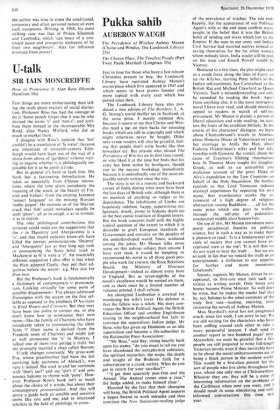U-talk
SIR IAIN MONCREIFFE
How to Pronounce It Alan Ross (Hamish Hamilton 30s) Few things are more embarrassing than tell- ing the truth about matters of social distinc- tion. Professor Ross has had the courage to do it. Some people forget that it was he who devised the terms `u' and 'non-u', and attri- bute them instead to the incomparable Mrs Rodd, alias Nancy Mitford, who did so much to market them.
I disagree with Ross's opinion that 'too' couldn't be a translation of le water', because
any inhabitant of sixteenth-century Edin- burgh would have leapt out of the way of a shout from above of `gardeloo' without wait- ing to inquire whether it is philologically im- possible for it to be garde a I'edu.
But in general it's hard to fault him. His book has a fascinating Introduction. He takes us peacefully from Chinese intona- tions, where the tone alters completely the meaning of the word, to the beauty of Fin- nish and Italian: from the existing Japanese `respect language' to the missing Russian `noble jargon'. He reminds us of the Shavian crack that 'fish' could nowadays equally be spelt `ghoti': gh as in cough, o as in women, ti as in station.
The only philological contributions this reviewer could make are the suggestions that the v in Daventry and Abergavenny is a `u'. and that stupid pedantic know-alls have killed the correct pronunciations `Daintry' and 'Abergenny' just as they long ago took to pronouncing the Scots letter yogh in Mackenzie as -if it were a 'z'. An essentially different suggestion I also offer is that when the Picts adopted Gaelic. they put their ad- jectives before the nouns: e.g. Mor dun for Dun mor.
But the Professor's book is fundamentally a dictionary of contemporary u pronuncia- tion. Looking critically for some point of possible disagreement: I've always addressed Gasvoignes with the accent on the first syl- lable as opposed to the emphasis D'Ascoigne in Kind Hearts and Coronets. But they may have been too polite to correct me, or else don't know how to pronounce their own name—like the family of Charteris who have mistakenly taken to pronouncing the silent Scots T (their name is derived from the Frankish town of Chartres) and might just as well pronounce the 'y' in Wemyss. I talked one of them into getting it right, but she promptly married a chap called Benson.
U-talk changes constantly. My great-aunt Eva, whose grandmother had been the last surviving lady patroness of Almack's, was very u indeed. She used to end her sentences with 'don't see?' and say 'ain't it' and pro- nounce balcony to rhyme with 'pony'. How- ever, Professor Ross's book isn't so much about the choice of u words, but about their contemporary pronunciation. And this will prove a guide both to sensible and sensitive snobs like you and me, and to interested scholars in the field of philology to come.


















































 Previous page
Previous page